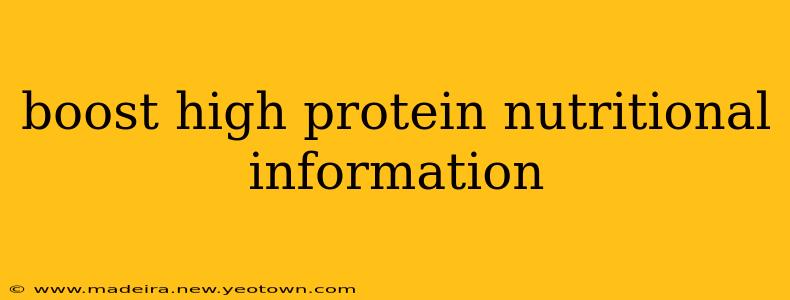Let's be honest, hitting your daily protein goals can feel like a marathon, not a sprint. But protein isn't just about building muscle; it's crucial for everything from boosting your metabolism to keeping your immune system strong. This comprehensive guide will delve into the nutritional powerhouse that is protein, explore different high-protein sources, and offer delicious ways to incorporate more into your diet. Get ready to power up your meals and feel the difference!
What are the benefits of a high-protein diet?
A high-protein diet offers a wealth of benefits beyond just muscle growth. Think of it as a multifaceted superhero for your body. Protein is the building block for tissues, enzymes, and hormones – essentially, it's the microscopic worker bee keeping everything running smoothly. Sufficient protein intake contributes to:
- Increased satiety: Protein keeps you feeling fuller for longer, which is fantastic for managing weight and curbing those pesky cravings.
- Enhanced metabolism: Your body burns more calories digesting protein compared to carbohydrates or fats, giving your metabolism a helpful boost.
- Stronger bones: Adequate protein intake is vital for maintaining bone density and reducing the risk of osteoporosis.
- Improved muscle mass: This is the classic benefit, but it’s crucial for strength, mobility, and overall physical function as we age.
- Boosted immune system: Protein is essential for the production of antibodies and other immune cells, helping your body fight off infections.
How much protein do I need per day?
This is a question that often sparks debate, and the answer isn't one-size-fits-all. Your individual protein needs depend on factors like your age, activity level, and overall health goals. Generally, recommendations range from 0.8 grams of protein per kilogram of body weight (the recommended daily allowance) to significantly higher amounts for athletes or individuals with specific fitness goals. Consulting a registered dietitian or nutritionist can help determine the optimal protein intake for your unique needs.
What are some good sources of high-protein foods?
The beauty of boosting your protein intake is the sheer variety of delicious options available! Forget bland chicken breast every day – let's explore some exciting possibilities:
- Lean meats: Chicken breast, turkey, lean beef, and fish (salmon, tuna, etc.) are classic choices packed with protein.
- Eggs: A nutritional powerhouse, eggs provide a complete protein profile and are incredibly versatile.
- Dairy products: Greek yogurt, cottage cheese, and cheese are excellent sources of protein, calcium, and other essential nutrients.
- Legumes: Lentils, chickpeas, beans – these are fantastic plant-based protein sources that also offer fiber and other beneficial nutrients.
- Nuts and seeds: Almonds, chia seeds, and pumpkin seeds are packed with protein and healthy fats.
- Soy products: Tofu, tempeh, and edamame are excellent plant-based protein sources.
- Protein powders: Whey, casein, soy, and pea protein powders can supplement your diet, especially convenient for post-workout recovery or quick protein boosts.
Are there any downsides to a high-protein diet?
While a high-protein diet offers many benefits, it's essential to be mindful. Consuming excessive protein can put a strain on your kidneys, especially if you have pre-existing kidney conditions. Furthermore, a diet overly reliant on protein might be deficient in other essential nutrients like fiber, vitamins, and minerals. Balance is key!
What are some delicious high-protein recipes?
The key to sticking to a high-protein diet is making it enjoyable! Here are a few ideas to inspire your culinary creativity:
- Greek Yogurt Parfait: Layer Greek yogurt with berries, granola, and a drizzle of honey for a protein-packed breakfast.
- Lentil Soup: A hearty and flavorful soup that’s both filling and packed with plant-based protein.
- Chicken and Vegetable Stir-fry: A quick and easy meal that’s packed with protein and essential nutrients.
- Salmon with Roasted Vegetables: A delicious and healthy dinner option high in both protein and omega-3 fatty acids.
How can I track my protein intake?
Tracking your protein intake can be helpful, especially when initially adjusting your diet. Many apps and websites are available to help you log your food and monitor your daily protein consumption. Remember consistency is key!
By incorporating these tips and strategies into your lifestyle, you’ll be well on your way to achieving your protein goals. Remember, consulting a healthcare professional or registered dietitian can offer personalized guidance to help you safely and effectively increase your protein intake and maximize its benefits.

